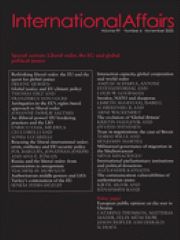Rethinking liberal order: the EU and the quest for global justice
The liberal order is facing severe challenges. This article introduces a special section, ‘Liberal order, the EU and global political justice’, which assesses the implications of these challenges for the European Union and for its ability to remain a relevant global actor. To do so, the different contributions inquire into the interconnections between the normative premises of the EU's foreign policy within different issue areas and those of the liberal order. Presenting the core themes, this introductory article suggests that liberal order is not merely a descriptive but also a normative concept. Indicating how a well-ordered international system ought to be organized, the liberal order generates expectations of a contribution to global justice. The article further advances the hypothesis that the troubles of the liberal order are linked to its inability to fulfill these expectations. As the EU's legitimacy is bound up with that of the liberal script, this hypothesis implies a need to reconsider not only core features of liberal order, but also those of the EU's approach to it. Thus highlighting the relevance of normative factors and their capacity for disruption, the article contributes to filling gaps in scholarly literatures both on the challenges to the liberal order and on the changing role of the EU in an increasingly unsettled world.
Ambiguities in the EU's rights-based approach to liberal order
The European Union has been characterized as a vanguard of a rights-based liberal international order. A prime example is making all cooperation agreements with third states conditioned on respect for human rights. But the EU's approach is contested on grounds of inconsistency and power imbalance. This article contributes to a more nuanced understanding of the relationship between authoritative human rights procedures and contestations of the liberal order. In doing so, the article brings to the fore ambiguities that are often glossed over in the literature related to representation in supranational political arrangements. Through a longitudinal case-study of the centrepiece of the EU's external human rights policy, the human rights clause, the article shows that the EU vacillates between supranational and intergovernmental political arrangements. It insists on a human rights clause that allows for sanctioning of non-compliance, but that also maintains core features of intergovernmental decision-making where executives in the EU and partner governments maintain the authority to initiate and settle disputes on human rights. The result is a half-hearted move towards a rights-based liberal order that neither fully respects nation-states' sovereignty nor fully allows for an impartial settlement of human rights disputes.
Full info
Helene Sjursen
Rethinking liberal order: the EU and the quest for global justice
International Affairs, 99(6), 2023, pp. 2203-2220.
DOI: https://doi.org/10.1093/ia/iiad240
Johanne Døhlie Saltnes
Ambiguities in the EU's rights-based approach to liberal order
International Affairs, 99(6), 2023, pp. 2203-2220.
DOI: https://doi.org/10.1093/ia/iiad227
